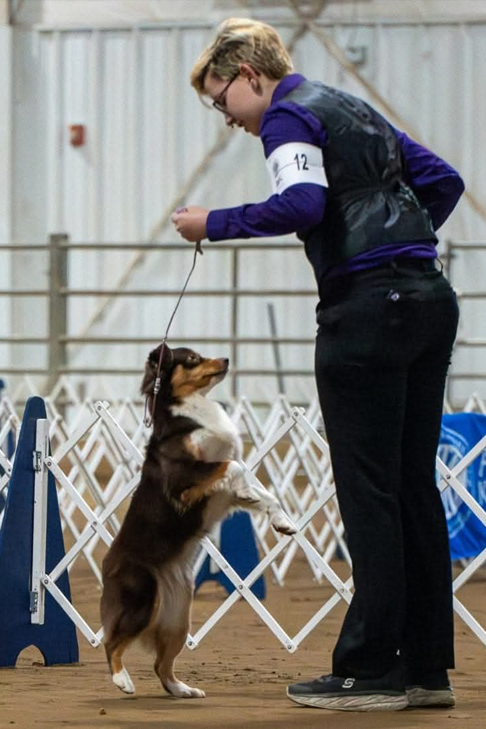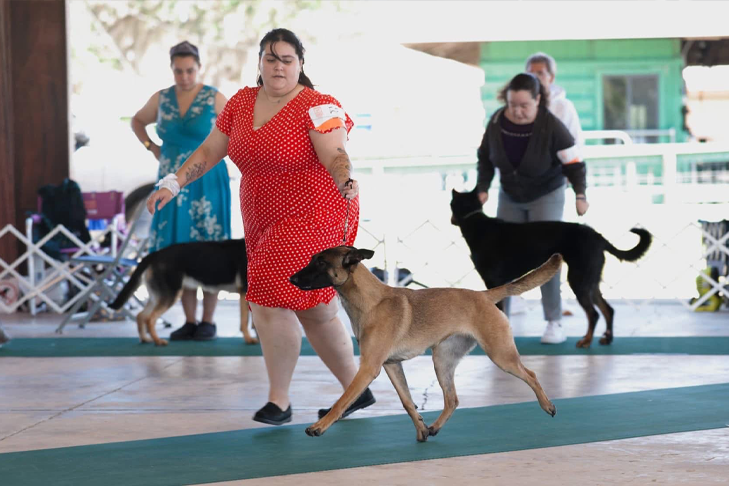Diversity among dogs and people makes our dog sports community stronger. For Pride month, we spoke to LGBTQ+ identified competitors to talk about the inclusion in the dog world and why being able to be visible, out, and proud is important to them.
Finding a Home in the Dog World
As a Junior Handler in the late 90s and early 2000s, I was worried about coming out to my conservative dog show family. Ultimately, when I did, I dealt with life-changing homophobia. Thankfully, over 20 years later, this kind of explicit homophobia is much less common, and I have been thrilled to witness the tremendous cultural shifts towards inclusivity and prioritizing diversity. I’ll never forget how meaningful it was to see the AKC logo turned rainbow for Pride. It would’ve meant so much to a teenage me who had dedicated their entire life to training dogs, only to lose their home and family because of their identity.
Fortunately, many people today feel accepted in the dog world upon coming out as LGBTQ+. Shelby Thatcher, a lesbian from Helendale, California, who is involved in conformation, IGP, and livestock work with her Bouvier Des Flandres, explains that she’s had only positive encounters. “I honestly feel like my experiences have been the same as if I was a straight woman,” she says. She notes that she has a very no-nonsense approach to life and has no tolerance for discrimination. “I don’t surround myself with anyone who would judge me for who I love. Anyone who would judge me, I don’t have enough respect for to let it bother me. My dog family is welcoming and loves me. Who I love has no effect on the knowledge I’m able to retain and my ability to work dogs.”

Dylan Leo, a transgender man in Tampa, Florida, is a breeder, owner, and handler who primarily competes in conformation and herding. He’s also competed in Obedience, AKC Rally, Agility, AKC Fast CAT, Diving Dogs, and Barn Hunt with his Miniature American Shepherd. He says he’s had a “varied” experience competing in sports. “I have had a lot of people not agree with the way I identify, while I have also had a lot of support from others. It’s really a mixed bag,” he explains.
Sami Morales of Miami, Florida, who identifies as bisexual and is active in conformation and AKC Fast CAT with her Standard Poodle, explains that in her case, the biggest issue has been online discrimination. While good sportsmanship should extend to the internet, it doesn’t always. “I’ve never had anyone outright make negative comments in person. Online is a different story. There is a lot of bias, and often mocking, when I’ve asked if a particular breeder or handler is LGBTQ+ friendly.” Her approach for dealing with this kind of behavior? “I brush it off as them hiding behind a screen, and focus on all of the positive interactions I’ve had.”
Standing Up for Diversity in the Dog World
As a community of dog sports participants, we are always looking for ways to get more people engaged and involved. One important way we can accomplish this goal is by ensuring that shows and clubs are welcoming and inclusive. Something each person can do is ensure equitable treatment for everyone who joins classes, trials at shows, or gets involved with a club, regardless of their identity. Dog clubs looking to create a welcoming and inclusive environment can implement some tips that help make dog events more welcoming to LGBTQ+ owners, handlers, and spectators.
Dog community members can also stand up for diversity by ensuring their elected club officials reflect their inclusive values. Morales suggests that club members can “address the negative behavior of others when it occurs, and don’t let them get away with treating an LGBTQ+ person poorly just to avoid confrontation. Stop giving them positions of power within your clubs if you know their behavior reflects judgment and dislike for the LGBTQ+ community.” Then, she encourages club members to elect club representatives who are supportive and respectful of everyone.
For Morales, the power of community can’t be understated. “We are stronger together, with respect and kindness! There is already too much negativity and hatred in this world. Our mutual love and passion for dogs should unite us, not divide us. Make space for that in your heart, and we can change the way the dog community views LGBTQ+ people.”
The Power of Visibility in the Dog World

As a handler, Wells has prioritized building a diverse and welcoming dog show community. “I’ve also connected with other LGBTQ+ handlers and breeders, which has created a sense of community and solidarity. Visibility matters, and I’m proud to show up as my authentic self in a space I love,” she says. Ultimately, a uniting belief among many LGBTQ+ handlers is the hope that their presence and visibility can help others feel safer in the dog world.
“Being out and open means that I’m living my life, my truth, and who I am. It also shows the younger generation that it’s okay to be out and proud. You don’t need to hide or cower; there are people to protect and support you,” Morales says. Similarly, Thatcher encourages any LGBTQ+ person involved or considering getting involved in the dog world to be their authentic selves. “Be proud of who you are and wear unbreakable confidence,” she says.
In addition to helping make other LGBTQ+ people feel safer, this visible presence also sets the tone for creating a larger welcoming environment at shows and in clubs. I often think about how meaningful it would have been for me as a Junior Handler in the process of coming out and experiencing homophobia to see LGBTQ+ competitors at my local shows. “I don’t want to feel like I am having to hide my identity from something I spend so much time involved in. Everyone should be able to feel comfortable being who they are in this community,” says Leo. “We’re all from such different backgrounds, but really, in the long run, the thing that brings us all together is our love of dogs, and I think that’s pretty amazing.”